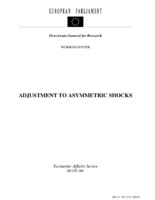Adjustment to asymmetric shocks Economic Affairs Series Econ104
| dc.contributor.author | European Parliament |
| dc.contributor.author | Patterson, Ben |
| dc.contributor.author | Amati, Simona |
| dc.date.accessioned | 2019-10-08T07:14:39Z |
| dc.date.available | 2019-10-08T07:14:39Z |
| dc.date.issued | 1998-09 |
| dc.identifier.uri | https://ketlib.lib.unipi.gr/xmlui/handle/ket/1209 |
| dc.description | AX-17-98-241-EN-C |
| dc.description | Economic Affairs Series ECON-104 AX |
| dc.description.abstract | The fact of monetary union means that over 60% of Member States’ external trade will automatically become domestic transactions. By comparison with the individual countries making it up, therefore, the euro area will be an autarkic economy, with external trade accounting for only between 10%-15% of GDP, (depending largely upon whether all 15 Member States eventually participate). |
| dc.format.extent | 74p. |
| dc.language.iso | en |
| dc.language.iso | fr |
| dc.language.iso | de |
| dc.publisher | European Parliament |
| dc.subject | Economic Affairs |
| dc.subject | Asymmetry |
| dc.subject | Macroeconomic |
| dc.subject | Improving markets |
| dc.subject | Exchange rates |
| dc.title | Adjustment to asymmetric shocks Economic Affairs Series Econ104 |
| dc.type | paper |
| dc.publisher.place | Luxembourg |

